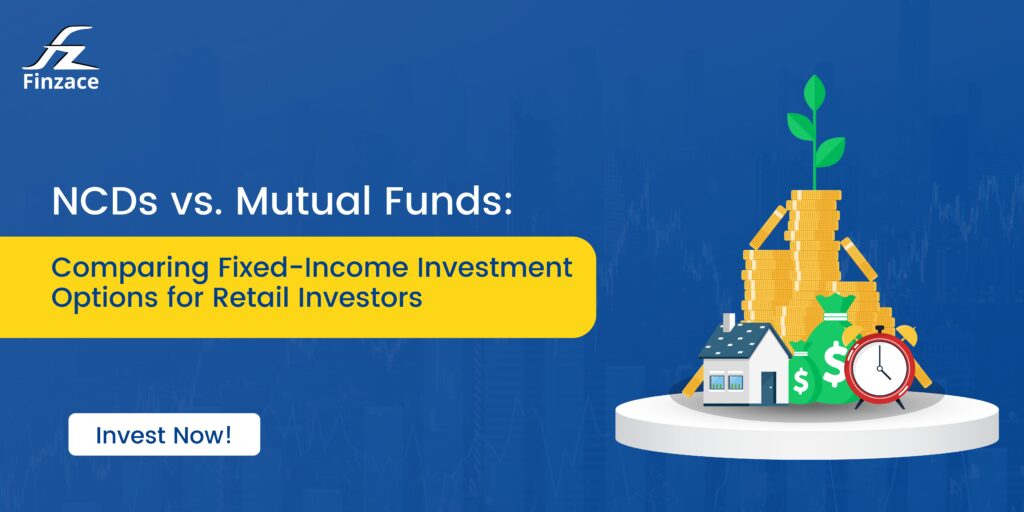Retail investors frequently search for fixed-income investing solutions that offer a balance between capital preservation, consistent returns, and safety. Mutual funds and non-convertible debentures (NCDs) are two common options in this market. Both investment options satisfy various investment tastes and provide special benefits. To assist you in making an informed choice, we will compare mutual funds and NCDs in this blog post by looking at their characteristics, advantages, and possible disadvantages.
Understanding Non-Convertible Debentures (NCDs)
Debt instruments known as NCDs are issued by businesses to raise money. Because they cannot be changed into equity shares of the issuing corporation, they are referred to as “non-convertible”. NCDs have a predetermined maturity date and a fixed interest rate. They come in two flavors: secured and unsecured. The assets of the issuer back secured NCDs.
Key Features of NCDs:
1. Fixed Returns: NCDs offer a predetermined interest rate, providing predictable income.
2. Tenure: NCDs have a fixed maturity period, usually ranging from one to ten years.
3. Liquidity: NCDs can be traded on stock exchanges, but liquidity can vary depending on market conditions.
4. Taxation: Interest earned on NCDs is taxable as per the investor’s income tax slab.
Benefits of NCDs:
1. Stable Income: The fixed interest rate ensures regular income, making NCDs suitable for conservative investors.
2. Capital Preservation: As debt instruments, NCDs are generally less volatile than equities.
3. Higher Returns: NCDs often offer higher interest rates compared to traditional fixed deposits.
Drawbacks of NCDs:
1. Credit Risk: The risk of default by the issuer exists, especially with unsecured NCDs.
2. Interest Rate Risk: If market interest rates rise, the fixed interest rate on NCDs may become less attractive.
3. Liquidity Risk: Selling NCDs in the secondary market can be challenging if there is low demand.
Understanding Mutual Funds
Mutual funds combine the capital of several participants and use it to purchase a variety of securities, such as bonds, stocks, and other assets. Particularly, fixed-income mutual funds concentrate on debt instruments and offer a combination of fixed income and possible capital growth.
Key Features of Mutual Funds:
1. Diversification: Mutual funds invest in a range of securities, reducing the impact of any single investment’s performance.
2. Liquidity: Open-ended mutual funds offer high liquidity, allowing investors to redeem units at the prevailing Net Asset Value (NAV).
3. Professional Management: Fund managers actively manage the portfolio, aiming to achieve the fund’s investment objectives.
4. Taxation: Returns from mutual funds are subject to capital gains tax, with different rates for short-term and long-term gains.
Benefits of Mutual Funds:
1. Diversification: Reduces risk by spreading investments across various securities.
2. Accessibility: Low minimum investment amounts make mutual funds accessible to retail investors.
3. Flexibility: Investors can choose from a wide range of funds based on their risk tolerance and investment goals.
4. Professional Management: Experienced fund managers handle investment decisions, potentially enhancing returns.
Drawbacks of Mutual Funds:
1. Management Fees: Mutual funds charge management fees, which can impact overall returns.
2. Market Risk: The value of the mutual fund can fluctuate with market conditions, affecting returns.
3. Complexity: The wide variety of mutual funds can be overwhelming for new investors to navigate.
Comparing NCDs and Mutual Funds
1. Risk and Return:
– NCDs offer fixed returns and lower risk, but they are subject to credit and interest rate risks.
– Mutual funds provide diversified exposure, and potentially higher returns, but come with market risk.
2. Liquidity:
– NCDs have limited liquidity, depending on market demand.
– Mutual funds offer high liquidity, especially open-ended funds.
3. Investment Horizon:
– NCDs are suitable for investors with a specific investment horizon matching the NCD’s maturity.
– Mutual funds cater to various investment horizons, from short-term to long-term.
4. Taxation:
– Interest from NCDs is taxable as income, impacting net returns.
– Mutual funds enjoy more favorable tax treatment on long-term capital gains, especially equity-oriented funds.
5. Convenience:
– NCDs require investors to monitor credit ratings and market conditions.
– Mutual funds offer a hands-off approach with professional management.
Conclusion
Both NCDs and mutual funds have their place in a retail investor’s portfolio, depending on individual financial goals, risk tolerance, and investment horizon. NCDs are ideal for those seeking fixed returns and lower risk, while mutual funds offer diversification and the potential for higher returns through professional management. By understanding the features, benefits, and risks associated with each option, investors can make informed decisions to build a balanced and resilient portfolio. Consulting with a financial advisor can further help tailor an investment strategy that aligns with your specific needs and objectives.
Balancing risk and return is crucial in the pursuit of yield. By diversifying across various types of fixed-income investments—corporate bonds—investors can achieve stable and potentially high returns. Always consider your risk tolerance, and investment horizon, and consult with a financial advisor to tailor these investments to your specific needs.
Discover Finzace: Your Partner in High-Yield Investing
At Finzace, we specialize in helping you find the best fixed-return investment in India and high-return fixed-income investments globally. Our app offers a comprehensive range of low-risk investment options in India, including secured investment options and the best safe investments with high returns.
For those seeking the best short-term fixed-income investments or exploring investment in NCDs (Non-Convertible Debentures), Finzace provides detailed insights and expert guidance. High-yield corporate bonds and other high-return fixed-income instruments are easily accessible through our platform.
Download Finzace today and start building a diversified portfolio with the best fixed-return investments, secured options, and expert advice tailored to your needs. Secure your financial future with Finzace, your trusted partner in high-yield investing.

